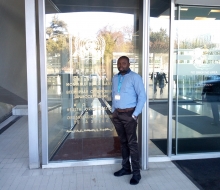Young health activist watcher at the WHO Executive Board

Sherif Olanrewaju from NANNM, Nigeria, who attended the WHO EB 142 Watch, reports on his invaluable experience.
My name is Sherif Adewale OLANREWAJU, I am a psychiatric/mental health nurse and national youth coordinator of the National Association of Nigeria Nurses and Midwives (NANNM) a PSI affiliate. I am also the elected assistant secretary of Nigeria Labour Congress (NLC) youth committee. This year, I had the opportunity to be the first from the African region to represent PSI as a member of the WHO Executive Board Watch team during the 142nd WHO EB session. I consider this opportunity as an invaluable capacity building avenue for young health professionals and labour leaders to gain an understanding of the dynamics of global health politics and policy formulation process.
I joined 14 other health care professional activists and academics from across the globe for an intensive four-day workshop at the PSI head office in Ferney-Voltaire, to scrutinize the agenda for the WHO 142nd Executive Board meeting. We used this time to make presentations, critique documents and make critical analysis of the significance of all items on the agenda as they affect people’s health. I presented two items on the agenda: Non-communicable diseases and WHO reform. Working assiduously, we came up with our positions from the civil society organizations’ perspective and thus developed statements and policy briefs which advocated that decisions taken by the executive board will place people over profit.
The 5th day was used to engage in consultations with other civil society organizations. We shared presentations about our views and positions to enable us to adopt a common stance with the civil society movement organisations. The Executive Board meeting provided not only a platform for a deeper insight into global health politics, but also an excellent opportunity to make small contributions to help improve the health of billions of lives. As WHO watchers, we engaged in lobbying delegates from several countries as they sought to make contributions on the issues that affect the poor and marginalized. We also provided a strong opposition to the anti-people’s agenda, notably corporate power under the guise of Public Private Partnerships (PPP).
To provide wide publicity and increase awareness, we engaged thousands of people via social media using Skype, Facebook and Twitter, thus increasing accessibility to the discussion. Many delegates were willing to engage with us and consider our views. I look forward to building on the gains of this invaluable experience by engaging delegates from my region to future WHO meetings and advocating for health policies with positive impacts on people’s health. I also intend to hold talks with young labour leaders, health activists and academics in my region to sensitize them on the importance of being available to make contributions during the formulation phase of health policies. This will not only afford them the opportunity to contribute to policy formulation, but also reduce the conflicts that may arise between the unions and government at the policy implementation phase.
The PHM organizes a similar Watch at the World Health Assembly. Lena Vennberg for Vardforbundet, Sweden, participated in the WHA Watch last May.
This article is an extract from the “Right to Health” newsletter issue 04 (April/May 2018). Subscribe to the newsletter. Send us your stories.

